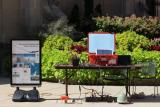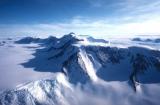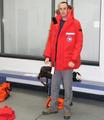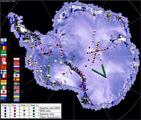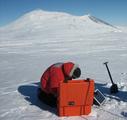
Brian Bonnett installs a MEVO station.
The PASSCAL Polar Program supported MEVO experiment was a seismic refraction experiment designed to image the magma chamber of the Mt. Erebus volcano in Antarctica. The Principle Investigators (PI's) and primary researchers involved with this experiment were Dr. Phillip Kyle, Dr. Richard Aster, Dr. Catherine Snelson, Dr. Daria Zandomeneghi and Hunter Knox. The project was funded through a grant awarded to the PI's by the National Science Foundation Office of Polar Programs. A paper that discusses this experiment has been published in EOS, Transactions, American Geophysical Union entitled: “Seismic Tomography of Erebus Volcano, Antarctica” authored by Zandomeneghi et al. (See the end of the article for details.)

